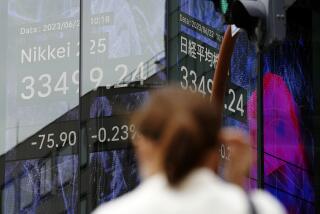West Germans Push Up 2 Key Lending Rates
- Share via
WASHINGTON — West Germany’s central bank pushed up two key lending rates Thursday, sending U.S. financial markets into a brief tailspin and abruptly ending a week-old rally that had been fueled by speculation that the Federal Reserve might allow U.S. interest rates to fall.
The German action, which caught traders by surprise, provided another sign of how intertwined global financial markets have become in recent years.
The move apparently surprised President Bush as well and could lead to renewed tensions between West Germany and the Administration over international economic policies aimed at quelling inflation and stabilizing the U.S. dollar.
Bush Complained to Reporters
When the German announcement came, Bush had just finished arguing to reporters that the recent budget agreement with Congress deserved credit for sparking a stock market rally and that interest rates remained unnecessarily high, despite the budget action.
“I was very pleased with the market reaction to the budget agreement,” Bush told a group of reporters. But he added: “I’m not heartened by the interest rates.”
If anything, many market traders were reported to be disappointed that the budget agreement had made only a modest dent in the federal deficit, while papering over most differences between Congress and the White House.
Bush complained to reporters that the link between the budget accord and the market rally had been “under-reported” in the press. Most analysts, however, contend that the recent rally in the stock and bond markets was sparked by last Friday’s reports on consumer prices and housing, which showed the economy slowing and encouraged hopes that the Federal Reserve would ease its grip on credit.
The German Bundesbank, by raising its discount rate to 4.5% from 4% and its Lombard rate to 6.5% from 6.0%, dashed those hopes. The discount rate is a benchmark for other rates, and the Lombard rate is the rate at which the Bundesbank lends to banks against securities pledged as collateral.
Bond Market Surprised
Only last week, Bundesbank Vice President Helmut Schlesinger had said the central bank saw no need to raise interest rates.
“The German move caught the bond market with its pants down,” said Lyle Gramley, a former Federal Reserve governor who is now chief economist at the Mortgage Bankers Assn. “Traders had been swept up in a mood of euphoria over signs of the softening economy, but the Bundesbank action brought them down to earth by reminding us that the Fed has very limited freedom to reduce interest rates.”
Bond prices dropped abruptly and interest rates moved higher after the West German move, but rates eased slightly later in the day.
Similarly, the stock market fell sharply in early trading. But the Dow Jones industrial average, which had been down as much as 20 points, ended off 9.53 for the day at 2,377.38 after rising by 90.91 points in the four previous trading sessions.
The dollar also fell sharply, hitting its lowest level against the mark since early March.
The West German rate increases, which helped pull money out of the dollar by making German financial instruments more attractive to investors, were echoed almost immediately by the Dutch and Austrian central banks.
A French official said his government has no plans to match the Bundesbank move. The French Ministry of Economics official told the Associated Press, however, that France might raise lending rates if the franc’s stability is threatened.
Times Staff Writer Jim Gerstenzang contributed to this story.
More to Read
Inside the business of entertainment
The Wide Shot brings you news, analysis and insights on everything from streaming wars to production — and what it all means for the future.
You may occasionally receive promotional content from the Los Angeles Times.









